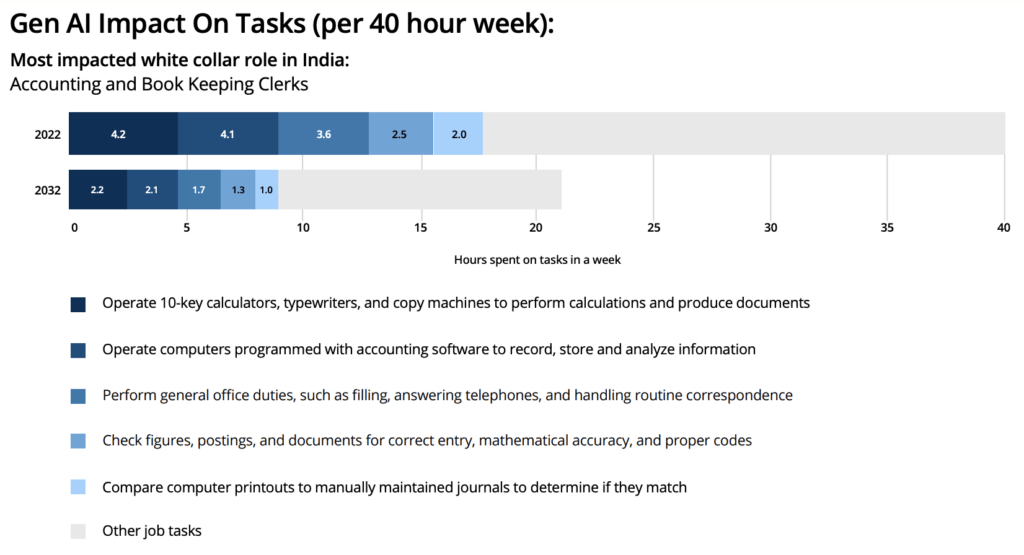The growing concern that artificial intelligence (AI) will significantly shake up the job market and humanity as a whole has been gaining momentum each month. In a recent report, titled ‘Gen AI Proof Jobs’ by Pearson, a noteworthy observation comes to light: the impact of generative AI on white-collar jobs will be more profound than blue-collar roles in India over the next decade.
Blue-collar roles, particularly those associated with creativity, hands-on skills, and collaborative teamwork, appear to have a certain level of resilience against disruptions brought about by the rise of generative AI technology. In contrast, individuals engaged in white-collar jobs in India, which typically involve decision-making, managerial, or administrative tasks, must be prepared for the worst days to come.
Task-Level Disparities: White-Collar vs. Blue-Collar
The recent findings from Pearson’s Skills Outlook report underscore a notable contrast in the task-level impact on white-collar and blue-collar roles within the Indian job market. A notable 29% difference is observed between the most impacted tasks in each category. The top five least impacted blue-collar positions exhibit zero task impact, while in the white-collar job domain, even the least affected roles bear a discernible impact of approximately 10% or more on their tasks.
Certain white-collar positions, particularly administrative roles, where employees frequently handle repetitive tasks like scheduling appointments or managing calls, are anticipated to experience a significant impact from AI. The potential magnitude of this impact is noteworthy, with an estimated 30% or more of the time dedicated to tasks within the workweek of specific white-collar roles expected to be efficiently handled by generative AI.
Certain jobs in white-collar professions, especially those that involve tasks related to mathematics (like engineering), are being significantly affected by technological advancements like generative AI. However, these jobs are proving to be somewhat resistant or resilient due to the recognized limitation of generative AI in accurately performing complex mathematical computations. This limitation, for now, protects these jobs better from being automated or replaced by AI compared to others. It highlights how the nature of tasks within certain white-collar professions plays a role in determining their susceptibility to the influence of emerging technologies.
On the flip side, numerous blue-collar jobs, such as mechanics and construction workers, require manual labour and customer service elements, making them challenging to replicate with generative AI. Surprisingly, less than 1% of the time spent on tasks involved in a blue-collar worker’s workweek can be effectively handled by generative AI by 2032.
Most Impacted White-Collar Roles by Gen AI
The report discloses the anticipated impact of Generative AI automation on certain white-collar roles in India by 2032, measured as a percentage of time spent on tasks.
- Accounting tasks and bookkeeping clerks: Anticipated a 46% reduction in time spent.
- Word Processor and Related Operators: Expected 40% reduction.
- Administrative Secretaries and Related Associate Professionals: Projected 38% reduction.
- Stall and Market Salespersons: Envisaged 30% reduction.
- Accountants: Foreseen 28% reduction.

Least Impacted White-Collar Roles by Gen AI
Least impacted White Collar Roles, each with a projected 10% reduction in time spent:
- Working Proprietors, Directors, and Executives in Transport and Communication.
- Working Proprietors and Directors in Lodging and Catering Services.
- Sales and Marketing Managers.
- Working Proprietors and Directors in Manufacturing, Wholesale & Retail.
- Lawyers.
Task-Level Impact: Most Impacted Blue-Collar Roles
- Basketry Weavers, Brush Makers and Related Workers: 17% reduction in time spent
- Weaving and Knitting Machine Operators: 16% reduction in time spent
- Waiters and Bartenders: 15% reduction in time spent
- Bakers, Pastry Cooks, and Confectionery Makers: 15% reduction in time spent
Generative AI is rapidly transforming the professional landscape, especially in white-collar sectors, demanding swift adaptation from both employees and employers. Unlike their counterparts in blue-collar roles, those in white-collar professions must act promptly to upskill, reskill, and envision the evolution of their jobs. Soft skills such as creativity, communication, and leadership take centre stage as they resist easy replication by AI. White-collar workers should not only enhance these soft skills but also embrace generative AI as a tool for efficiency, particularly in automating repetitive tasks.

